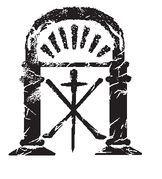PRELUDE
March 1891

WEDNESDAY 25TH MARCH 1891
This story begins in a city of bones. In the alleyways of the dead. In the silent boulevards, promenades and impasses of the Cimetière de Montmartre in Paris, a place inhabited by tombs and stone angels and the loitering ghosts of those forgotten before they are even cold in their graves.
This story begins with the watchers at the gates, with the poor and the desperate of Paris who have come to profit from another’s loss. The gawping beggars and sharp-eyed chiffonniers, the wreath makers and peddlers of ex-voto trinkets, the girls twisting paper flowers, the carriages waiting with black hoods and smeared glass.
The story begins with the pantomime of a burial. A small paid notice in Le Figaro advertised the place and the date and the hour, although few have come. It is a sparse crowd, dark veils and morning coats, polished boots and extravagant umbrellas to shelter from the unseasonable March rain.
Léonie stands beside the open grave with her brother and their mother, her striking face obscured behind black lace. From the priest’s lips fall platitudes, words of absolution that leave all hearts cold and all emotion untouched. Ugly in his unstarched white necktie and vulgar buckled shoes and greasy complexion, he knows nothing of the lies and threads of deceit that have led to this patch of ground in the 18th arrondissement, on the northern outskirts of Paris.
Léonie’s eyes are dry. Like the priest, she is ignorant of the events being played out on this wet afternoon. She believes she has come to attend a funeral, the marking of a life cut short. She has come to pay her last respects to her brother’s lover, a woman she never met in life. To support her brother in his grief.
Léonie’s eyes are fixed upon the coffin being lowered into the damp earth where the worms and the spiders dwell. If she were to turn, quickly now, catching Anatole unawares, she would see the expression upon her beloved brother’s face and puzzle at it. It is not loss that swims in his eyes, but rather relief.
And because she does not turn, she does not notice the man in grey top hat and frock coat, sheltering from the rain under the cypress trees in the furthest corner of the cemetery. He cuts a sharp figure, the sort of man to make une belle parisienne touch her hair and raise her eyes a little beneath her veils. His broad and strong hands, tailored in calfskin gloves, rest perfectly upon the silver head of his mahogany walking stick. They are such hands as might circle a waist, might draw a lover to him, might caress a pale cheek.
He is watching, an expression of great intensity on his face. His pupils are black pinpricks in bright, blue eyes.
The heavy thud of earth on the coffin lid. The priest’s dying words echo in the sombre air.
‘In nomine Patri, et Filii, et Spiritus Sancti. Amen. In the name of the Father, the Son, and the Holy Ghost.’
He makes the sign of the cross, then walks away.
Amen. So be it.
Léonie lets fall her flower, picked freshly in the Parc Monceau this morning, a rose for remembrance. The bloom spirals down, down through the chill air, a flash of white slowly slipping from her black-gloved fingers.
Let the dead rest. Let the dead sleep.
The rain is falling more heavily. Beyond the high wrought-iron gates of the cemetery, the roofs, spires and domes of Paris are shrouded in a silver mist. It muffles the sounds of the rattling carriages in the Boulevard de Clichy and the distant shrieks of the trains pulling out from the Gare Saint-Lazare.
The mourning party turns to depart the graveside. Léonie touches her brother’s arm. He pats her hand, lowers his head. As they walk out of the cemetery, more than anything Léonie hopes that this may be an end to it. That, after the last dismal months of persecution and tragedy, they might put it all behind them.
That they might step out from the shadows and begin to live again.
But now, many hundreds of miles to the south of Paris, something is stirring.
A reaction, a connection, a consequence. In the ancient beech woods above the fashionable spa town of Rennes-les-Bains, a breath of wind lifts the leaves. Music heard, but not heard.
Enfin.
The word is breathed on the wind. At last.
Compelled by the act of an innocent girl in a graveyard in Paris, something is moving within the stone sepulchre. Long forgotten in the tangled and overgrown alleyways of the Domaine de la Cade, something is waking. To the casual observer it would appear no more than a trick of the light in the fading afternoon, but for a fleeting instant, the plaster statues appear to breathe, to move, to sigh.
And the portraits on the cards that lie buried beneath the earth and stone, where the river runs dry, momentarily seem to be alive. Fleeting figures, impressions, shades, not yet more than that. A suggestion, an illusion, a promise. The refraction of light, the movement of air beneath the turn of the stone stair. The inescapable relationship between place and moment.
For in truth, this story begins not with bones in a Parisian graveyard, but with a deck of cards.
The Devil’s Picture Book.